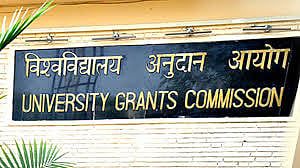Recently, the UGC has released the new draft of the UGC (Minimum Qualifications for Appointment and Promotion of Teachers and Academic Staff in Universities and Colleges and Measures for the Maintenance of Standards in Higher Education) Regulations, 2025.
Normally, UGC regulations are issued only after every pay revision by the recommendation of the respective pay review committee. This convention was, accordingly, followed after both the report of the Sixth Pay Review Committee in 2010 and the report of the Seventh Pay Review Committee in 2018. Thus, the release of the new draft regulations is surprising and unwarranted. In any case, the draft proposes many major and minor changes in the regulations. Here’s a brief review of these changes.
One major change is regarding the subject for which an appointment can be made. There are two changes: First, it is stated that the discipline/subject chosen in the 4-year UG programme or PG programme is different from the chosen discipline/subject in Ph.D., and the discipline/subject in which a candidate obtained a Ph.D. (normally a narrow subject or topic) shall be considered eligible for appointment as assistant professor, associate professor or professor in that discipline/subject.
Similarly, it is stated that if the discipline/subject chosen in the 4-year UG programme or PG programme is different from the chosen discipline/subject in NET/SLET, the discipline/subject in which a candidate qualified NET/SLET shall be considered eligible for appointment as Assistant Professor in that discipline/subject. In other words, the discipline in which the candidate has done rigorous study at the UG/PG level has been made ineligible for the appointment of a teacher.
I, for one, fail to understand the logic of this drastic and arbitrary change and fear that it would directly and adversely impact the quality of teaching. In fact, the subject choice at NET/SLET for eligibility of appointment would encourage coaching institutes to offer so-called ‘easy to score’ subjects.
Another change relates to the notable contributions to be considered by the selection committee for the recruitment and promotion of university and college teachers. Here, a narrow list of relevant topics is given, and topics vary from Teaching Contributions in Indian languages (excluding English) to Teaching-Learning and Research in the Indian Knowledge System, Consultancy, Student Internship, Digital Content Creation and the contribution regarding start-up and raising funds.
Sadly, the list suggests a basic lack of understanding of the very wide range of disciplines and subjects that colleges and universities in the country offer. Further, it fails to consider that teachers in colleges and universities are primarily concerned with teaching and research in their respective subjects. Essentially, the list reflects the narrow and ideological priorities of the present government and is unlikely to contribute to any improvement in the quality of higher education.
Another disturbing clause for teachers deals with the “Date of Eligibility for Promotion.” It states that when a candidate succeeds in an assessment for promotion, he/she would be eligible for promotion from the next eligible date, without any regard for the due date of promotion, as has been the practice so far. This change would lead to serious disruption and discrimination since it allows for a deliberate delay in promotional assessment of a teacher by the college and university authorities if they wish to punish him/her or, otherwise, for whatever reason, the date of assessment is delayed.
But the most objectionable and political clause in this draft relates to the process of appointment of vice-chancellors. The clause proposes to deny any role to the state government in the selection committee for the vice-chancellor. Instead, the selection committee would include a nominee each from the chancellor, the governor, a central government appointee, the UGC chairperson and the respective university senate or syndicate. The committee would recommend three to five names and the chancellor would appoint one of them as the vice-chancellor.
The draft warns that any violation in this regard could lead to denial of funding to the university under the UGC Act and prevent it from participating in UGC schemes! Given the reality of (often) acrimonious relationships between state governments run by opposition parties and the governor and the fact that education is on the concurrent list of the Constitution, the clause, thus, is another attempt by the UGC to further weaken the federal principles of the Constitution.
However, there are two clauses that I think are desirable and could widen the scope of teaching and learning and the leadership of colleges and universities as well. One states that HEIs may engage a limited number of experts, professionals and practitioners from industries and other professions for teaching and research as Professors of Practice. In a rapidly changing world, where our colleges and universities remain largely aloof from the world outside, some systematic exposure to that world from its practitioners would add to the learning experience of students and, perhaps, teachers as well.
Another welcome clause in the draft paves the way for the appointment of industrialists, bureaucrats and officers of the Public Sector Undertaking as vice-chancellors, apart from academicians. In principle, in my view, the widely held assumption that only academicians are best qualified to lead universities as vice-chancellors is misplaced. The present persistent, widespread and dismal state of many of our universities only confirms it. Of course, given the aggressive ideological push of the present government, one wonders, and I remain deeply sceptical, how this clause will play out in practice.
Vrijendra taught in a Mumbai college for more than 30 years and has been associated with democratic rights groups in the city
